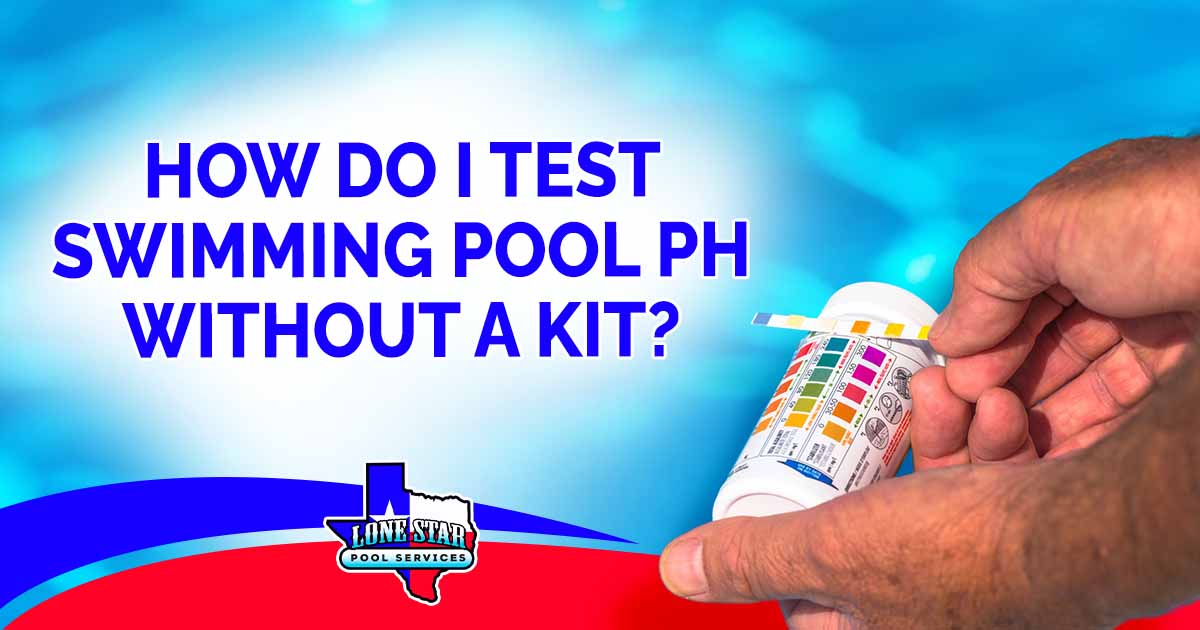Testing swimming pool pH is an important part of owning a pool. Testing pH on a regular basis will ensure that your pool is safe to swim in and that your pool pump operates properly. Unbalanced pool water creates an environment that can harbor bacteria and create algae growth. Bacteria in pool water are dangerous to people who swim in your pool and no one really wants to swim in a pool full of algae. Bacteria can cause many types of infection, so it is important to keep pools at the proper pH levels. Lone Star Pool Services suggest testing your pool pH at least once a week, but if you swim in your pool every day, it may be necessary to test pH levels more than once a week.
Testing Strips to Test the pH of Your Swimming Pool
Of course, you can always use a premade pH test kit to check your swimming pool pH, but who wants to deal with all those chemicals? Fortunately, there are more cost effective methods that will also save you some time. One method most people are familiar with is strip testing. Strip testing is a fast and easy solution to testing the pH of your pool’s water. All you need to do is simply dip a pH strip tester in your pool’s water and compare the color it turns to a chart.
Most pH testing strips come with a chart that you can use to determine the pH of your pool. Though using pH testing strips is fast and easy, they can create a hole in your wallet if you use them often enough. Most pH testing strips are sold in packs of 50 to 100 strips, but they can cost up to $20. $20 may not seem expensive, but using them enough will add up in the long run.
Electronic Tester to Test Swimming Pool pH
Another way to test swimming pool pH is by the use of an electronic tester. Compared to test strips, electronic pH testers have three advantages. First, electronic pH testers will give you an exact number. This is an advantage over strip testing, because with strip tests, you’ll have to guess what your pool’s pH is based on the color of a strip. Electronic pH testers, however, will give you an exact read out of your pool’s pH so there’s no guess work involved.
Second, electronic pH testers will save you money in the long run. While electronic testers can cost up to $100 dollars or more, there’s no need to refill them. They’re a one-time purchase! The last advantage of an electronic tester is related to the second advantage. With an electronic tester, you’ll never find yourself without a way to test your pool’s pH. That means you’ll never be caught off-guard again! If the investment of an electronic pH tester seems appealing to you, it should definitely be the go-to option because of its many advantages.
A Strange Method for Testing Swimming Pool pH
We’ve all been in a pinch when it comes to testing swimming pool pH before. Maybe you’re having a pool party in the afternoon and you want to get your pool ready before your guests come over, but you just can’t seem to find a way to test your pH. Don’t worry! Using science and a unique vegetable can help you out. You’ll need a red cabbage and distilled water. Bring the water to a boil and throw in the whole red cabbage. Boil the cabbage for at least 30 minutes, making sure to stir it occasionally.
After 30 minutes, strain the water to get out any loose particles that may be in the water. The water should now be purplish in tint. Next, put some of your pool water in a plastic container and add a few drops of the purple liquid to it. The water will change colors depending on the pH of your pool’s water. A lighter red indicates your pool is acidic, purple indicates the water is neutral, and light green indicates it’s alkaline. You can compare the color to a pH test chart to get a numerical reading. This method is a lot of work, but it’ll work in a pinch. Who knew science could help you go for a dip in the pool?
Why Testing the pH of a Swimming Pool is So Important
Besides bacteria and algae growth, testing swimming pool pH is an important step to ensure that your pool makes for a nice swim. Low pH can irritate the skin of swimmers. This is because low pH indicates that the water of your pool is acidic. Human skin is sensitive, and even a small amount of acidity can harm it, especially if you spend a couple of hours in it.
Low pH can also do damage to the metal in your pool. Acidic water can corrode metal over time, and low pH can do a lot of damage to pool rails and ladders. Low pH is a serious problem for heated pools. This is because a pool’s heater is made with a copper element, and it can corrode the element quickly.
Swimming Pool Testing with Lone Star Pool Services
If testing your swimming pool pH seems like a daunting task, Lone Star Pool Services can help you out. We offer a weekly pool service where we will make sure to maintain the proper chemical levels in your pool. Our weekly service is great for homeowners and business owners alike. Pool maintenance can be a giant time sink, but you could let us do it for you. You’ll have more time to do the things you love, like swim! We also offer a pool repair service if you are having trouble with your pool. We’ll take care of anything you need fixed. From pumps to heaters, our professionally trained technicians can help solve your problems fast to get your pool back up and running!

